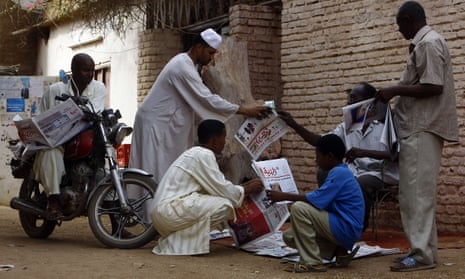Two prominent Sudanese editors are facing the death penalty over claims they are “inciting an Arab spring” and have introduced anti-government editorial policies at their newspapers.
Osman Marghani and Ahmed Yousef El Tay were seized by the intelligence services at their offices last Thursday. They face sentencing this week.
Marghani, editor-in-chief of the prominent El Tayar newspaper, said his publication had been made a scapegoat for widespread criticism of the government. “We were held by security officers and taken by cars from our offices, and they accused us of inciting people against the regime,” he said.
“I think the president is very angry about our media coverage of next year’s budget, and our criticism of the finance minister. So our newspaper is the scapegoat.”
The two men are accused of abusing their positions as journalists, publishing false news and undermining the constitutional system, a crime punishable by death in Sudan.
The Sudanese Journalists Network has condemned the arrests, urging all journalists to “counter the attack from the president and his intelligence agency”.
Marghani and El Tay are being charged under two articles of the criminal code, which adheres to Islamic Sharia law. Faisal Mohammed Salih, a journalist and human rights activist, says the code was in conflict with the constitution, which guarantees the right to “freedom of speech”.
“The government is facing a genuine challenge this time, and we will see whether they will respect their own laws and constitution, or not,” Salih said.

The arrests come just days after the Sudanese president, Omar al-Bashir, threatened the media and vowed to take “decisive measures” against journalists who criticise his finance minister, Bader El Deen Mahmoud.
Sudanese reporters have worked in an increasingly repressive climate since Bashir seized power in a Islamist-backed coup in 1989. The country currently ranks 174th out of 180 countries on Reporters Without Borders’ press freedom index.
Marghani’s El-Tayar newspaper was previously suspended for two years by the government before winning an appeal from the constitutional court in 2014. This year, the newspaper has had it’s entire print run confiscated by the security services more than 15 times.
In February, 14 daily papers were confiscated in one day, followed shortly by the seizure of copies of 17 further publications by the intelligence agencies.
“All over the world, the media shapes public opinion. Only in Sudan, when the newspapers disclose corruption or anything against the government, they get very angry,” Salih said.

Comments (…)
Sign in or create your Guardian account to join the discussion